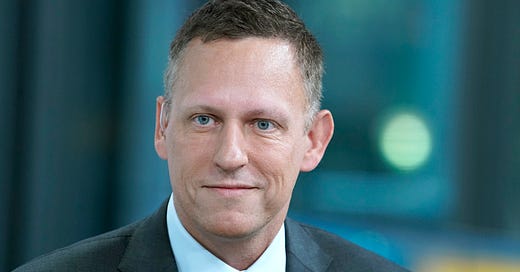Silicon Valley's Neighborhood Sauron
💀🐱🎙 We talk to Max Chafkin about "The Contrarian," his biography of Peter Thiel
My first question for Max Chafkin — the author of The Contrarian: Peter Thiel and Silicon Valley’s Pursuit of Power — was simple: Which character does Peter Thiel see himself as in the Lord of the Rings?
Who does he admire most?
Chafkin replied, “You’d be tempted to say he’s Gandalf or something. But there are two data points that work against that: One of which is that Palantir, like the main palantir in Lord of the Rings, is Sauron’s orb. So it’s an orb for evil.”
The second data point is Thiel’s obsession with The Last Ringbearer: “In The Last Ringbearer Sauron is the hero and the elves, I think the elves are like fascists, like anti-tech fascists or something.”
Sauron is the answer that I had in my mind. Thiel aspires to be that all-seeing eye.
Chafkin argued that you shouldn’t try to spend too much time on Thiel’s self-mythologizing (even though we couldn’t help ourselves for much of the latest episode of Dead Cat).
“People end up reading into his interest in various philosophers or religious subjects or whatever and there isn’t always as much of a there there as I think his fans would like,” Chafkin argued.
Chafkin offered one example where Thiel can appear a little bit deeper than he is.
Over the years, Thiel has offered a favorite passage from Lord of the Rings. “There’s a quote that was in his high school yearbook. And then he’s used that at least one other time in an interview. And I went looking for the passage. But it’s not actually from Lord of the Rings. It’s from a movie that came out — a cartoon movie of the Hobbit created by the creator ThunderCats. I think it came out in the mid 70s.”
The greatest adventure is what lies ahead.
Today and tomorrow are yet to be said.
The chances, the changes are all yours to make.
The mold of your life is in your hands to break.
The problem with Thiel is that, like Donald Trump in the Republican primaries, I can never decide how literally or seriously to take him.
One moment I agree with Chafkin that Thiel likes the aura of profundity but that the most reliable way to understand Thiel’s actions is just to follow the money. The next moment, I appreciate that Thiel asks more probing questions than most and truly is willing to go against the crowd even when I find the direction he’s heading morally reprehensible.
On the podcast, I offered an argument for why Silicon Valley has been so happy to keep Thiel in the fold even as his political views become more untenable for anti-Trump Democrats.
“Silicon Valley just loves to believe it’s small.” So if Silicon Valley is just a small game played by a handful of players who all know each other, at least Thiel keeps it interesting.
“And then Trump… makes it sort of a problem. Because all of a sudden people see that Thiel’s worldview has consequences.”
Chafkin wrote in Businessweek about Thiel’s meeting with Trump.
Thiel sat next to Trump with his arms tucked under the table, as if trying to shrink away from the president-elect. “I want to start by thanking Peter,” Trump began. “He saw something very early—maybe before we saw it.” Trump reached below the table groping for Thiel’s hand, found it, and raised it. “He’s been so terrific, so outstanding, and he got just about the biggest applause at the Republican National Convention,” he said, patting Thiel’s fist affectionately. “I want to thank you, man. You’re a very special guy.”
In our conversation, Chafkin suggested that people go back and read Thiel’s 2008 essay, The Optimistic Thought Experiment. I did after our conversation.
While the essay is, by its own admission, written in a way so as to be non-falsifiable, Thiel hits on one of the essential themes of our time: the perilousness of globalization.
Despite all this, the world may yet resume the globalist path. The narrative of the past four centuries has not been one of continuous progress, but strewn beneath the stories of cupidity and strife there lies the story of the powerful impulse toward globalization and of the transformational effects of technology. In this context, a near-term backlash against globalization should not be confused with the end of the world, though a wholesale rollback could represent the ultimate catastrophe.
For the policymaker as for the investor, the challenge is to find a way between the Scylla of outdated wisdom and the Charybdis of nihilistic cleverness. The agon between globalization and its alternative will be close — at least in the sense that individual choices will prove to be of decisive significance. In this, we are opposed to the reigning faith in efficient markets. Unlike the faith in efficient markets, however, ours is a faith that seemingly still cannot be named.






